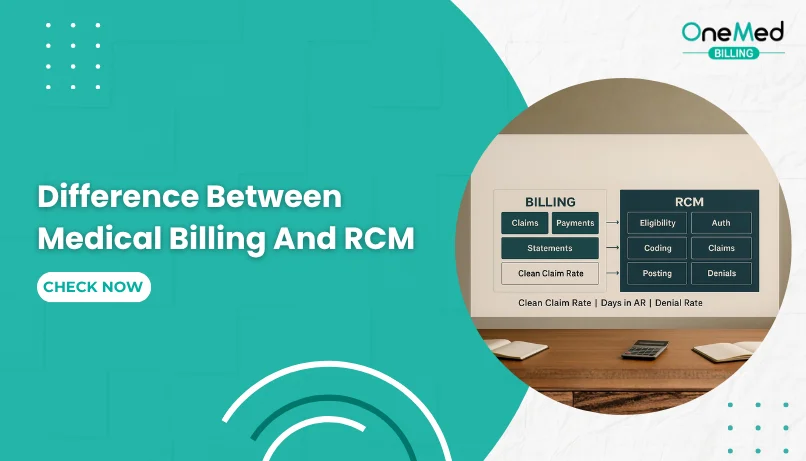Is Outsourcing or In-House Billing Better for Your Practice in 2025?
- Updated Date Aug 27, 2025
- Revenue Cycle Management
- Follow
In 2025, most healthcare practices will be outsourcing because it is cheaper, reimbursements come faster, denials will be handled effectively, and it has the services of professional billing teams. Although in-house billing is more controlled, outsourced billing is more efficient, scalable, and compliant; therefore, it is the more reasonable option in growing and limited resource practices.
With the constantly growing world of the healthcare industry, the revenue cycle management has never been as challenging and complicated as it is now. As the percentage of claims denials increases, as the payers change the way they operate, and as providers are expected to code accurately and receive their reimbursements on time and error-free, providers find themselves with incalculable stress on maintaining a steady, mistake-free cash flow.
Among the major decisions that healthcare organizations will need in 2025 is the decision to conduct the process of medical billing internally or to outsource the process to a specialist medical billing company. The options should be discussed with specific findings of benefits and pitfalls, and the decision should be based on the volume of a specific practice, the budget, the specialty, aims, and the internal resources available.
This guide will help you understand the in-house vs. outsourced billing debate using tangible insights into the real world, the present state of affairs, and even the performance indicators, so you know what model will suit your practice in 2025.
What Is In-house Medical Billing?

In house billing is where you get to control your billing operations in your practice with your staff. This comprises claim generation, charge posting, coding, submission, denials and collections on behalf of patients. All the activities related to billing are internal and are usually performed with integrated EHR and PM solution.
The Pros of In-House Billing:
More Control: You exercise firsthand control over the billing performance and can decide anytime.
Customization: Domain to integrate more into internal processes and more easily tailored to provider needs.
Direct Communication: Items can communicate to clinical staff and physicians with ease with billing staff.
Downside of In-House Billing:
Expensive Overheads: There are salaries, benefits, continuous training, software and infrastructure to meet.
Risk of Staff Turnover: The Turnover of important billing people would cut down the collections and compliance.
Restricted Knowledge: In house teams do not have expertise in other payers or specialties.
What is Out-sourced Medical Billing?

Outsourcing billing means that you contract your billing services to a third-party RCM Firm or medical billing firm that can do all or a portion of your billing functions. They are coding, claim management companies, payer communication companies, denial resolution companies and patient collection companies.
In 2025, the majority of outsourced billing firms also apply the use of AI, predictive analytics, and RPA (Robotic Process Automation) to enhance the accuracy of claims and accelerate reimbursements.
Advantages of Outsourced Billing:
Cost-saving & predictability of prices:
- Eliminates or minimized the need to have full-time billing personnel with terms of reduced salary and benefit costs.
- Does not incur expenses on licensing, billing software and round the clock maintenance.
- The vast majority of billing companies will bill a fee based on a percentage of collections (with rates being 4%-8%).
Better Claim Accuracy:
- Offers the services of certified coders and billing experts competent in the requirements of the payers.
- Results in the decrease of the number of rejected and denied claims because of improved coding compliance and complete accurate submissions.
Quick Revenue Cycle:
- Streamlines patient collections, diligent payer follow-ups and enables claims to be submitted in time.
- All-day coverage of the team enhances efficiency in operations and faster reimbursements.
Regulatory Compliance:
- The vendors on billing are qualified in regards to ICD-10, CPT, CMS, and HIPAA standards, which will minimize the risks of compliance to your practice.
Scalability and Flexibility:
- Gives the opportunity to scale services either upwards or down as your practice grows easily.
- Best suited to practices that are either spread over a wide area or are adding new specialties without having to face more administrative works internally.
Disadvantages of Outsourced Billing:
Weaker Commander
- The control over operations is external and it requires trust and constant communication with the billing partner.
Existence of risk of Misalignment:
- Other billing firms provide generic services that do not necessarily conform to your particular provider set ups and workflows.
Issue of Data Security:
- The external exchange of sensitive patient data needs powerful BAA contracts and ideal cybersecurity policies to guarantee confidentiality of data.
Outsource Medical Billing vs. In-House: Cost Comparison
|
Cost Factor |
In-House Billing |
Outsourced Billing |
|
Staff Salaries (2 billers) |
$100,000/year |
$0 (covered by vendor) |
|
Billing Software & Tools |
$15,000/year |
$0–Included in vendor package |
|
Training & Certifications |
$5,000/year |
$0 |
|
Denial & Compliance Risks |
High (dependent on staff) |
Lower (expertise provided) |
|
Vendor Fee (6% of revenue) |
$0 |
$60,000 on $1M revenue |
|
Total Annual Cost |
$120,000+ |
$60,000–$70,000 |
Conclusion
Making the decisions between outsourcing and in-house medical billing are not merely about striking equilibrium between expenses. It determines the efficiency, resilience, and the development of your practice. Outsourcing is a very effective strategic remedy in the competitive sphere of the healthcare industry nowadays where most providers need efficiency in their operations, peace of mind regarding regulatory matters and faster reimbursements so that they can concentrate on what is of utmost importance, the patient.
However, an in-house billing team can also be a powerful way of dealing with billing processes in the hands of practices that have strong leadership, solid structure, and specialized knowledge as well as the in-house billing process monitors direct control, and clinical workflow integration. The choice will always be the best decision, which will agree with your vision of working, which will support all the forces of your team, and secure financial sustainability to work with it in 2025 and more.
Frequently Asked Questions
Find quick answers to common questions about this topic, explained simply and clearly.
Is a practice more profitable when using in-house or outsourced billing services?
Profitability depends on the practice size, claim volume, and staff expertise. Outsourcing can reduce overhead and speed up collections, while in-house teams offer more control. The right choice balances cost, efficiency, and accuracy.
Which is better, outsourcing or in-house?
Outsourcing is often better for small to mid-size practices that need expertise without extra staffing. In-house works well for larger groups with strong billing infrastructure. Each model has pros and cons based on resources and goals.
Is outsourcing medical billing a good idea?
Yes, for many practices. It reduces administrative burden, improves claim accuracy, and speeds up reimbursements. However, it requires choosing a reliable partner and maintaining good communication.
What is outsourced billing?
Outsourced billing is when a medical practice hires an external company to handle coding, charge entry, claim submission, payment posting, and denial management.
What is in-house billing?
In-house billing is managed by a practice’s internal staff. The team handles all billing tasks using the practice’s systems and processes, maintaining full control over revenue cycle operations.






